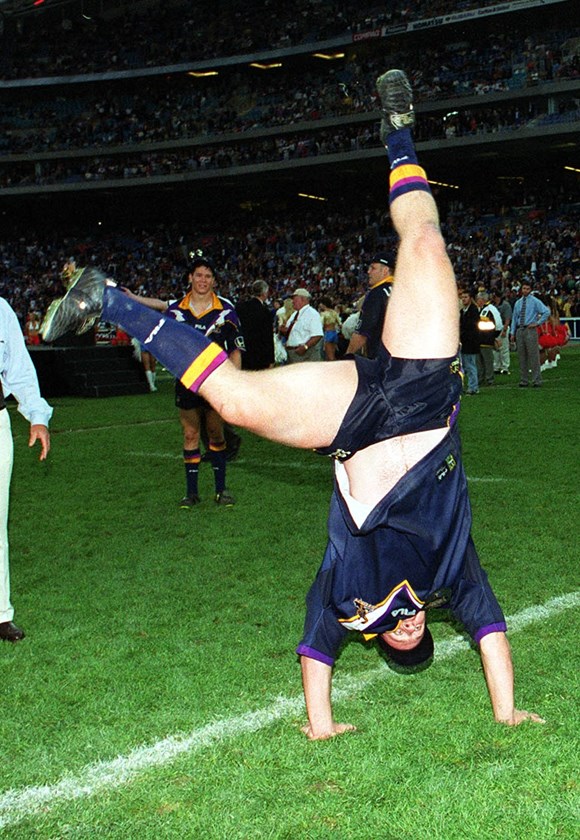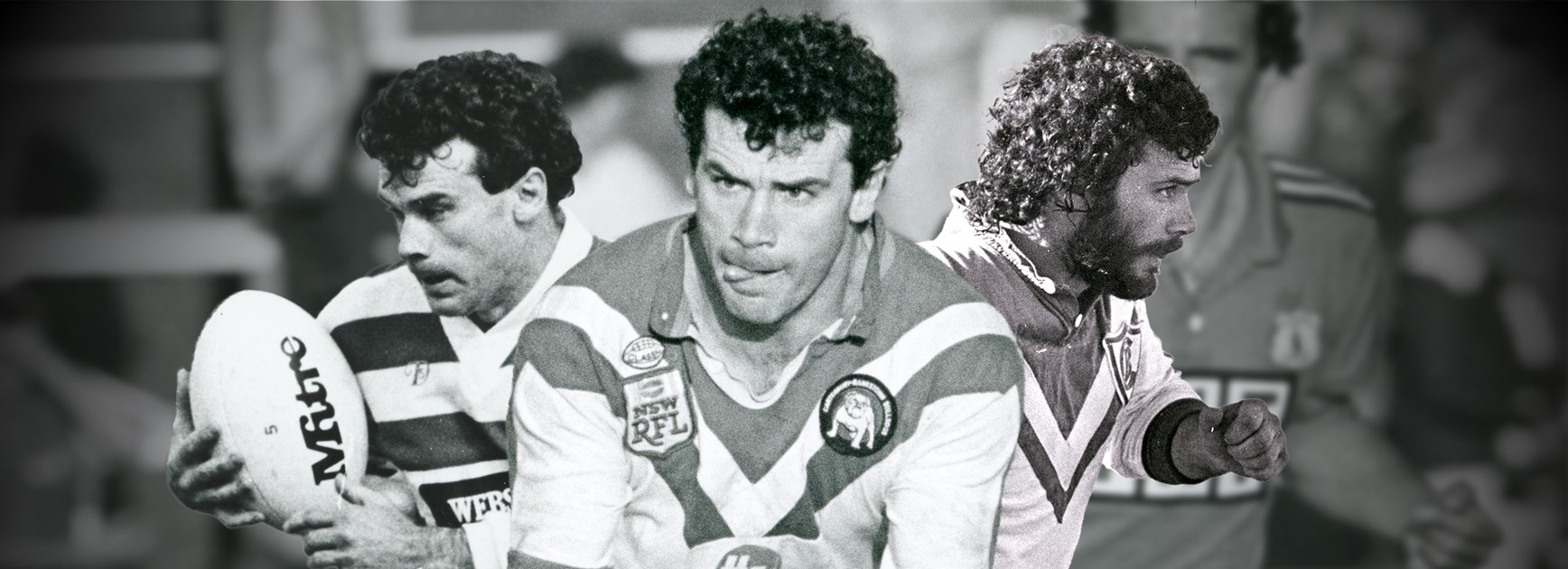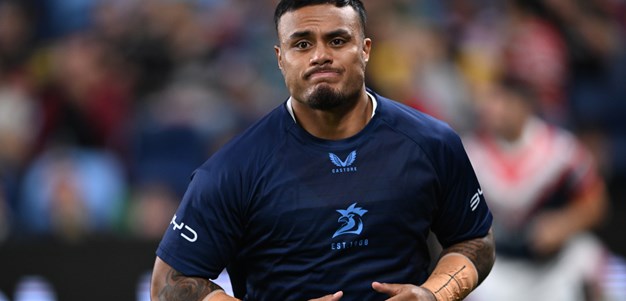Chris Anderson won premierships with the Canterbury Bulldogs as both a player and a coach. He also won a grand final coaching Melbourne Storm and 24 of 27 Test matches as Kangaroos coach.
Considering that as a player he racked up 284 games for the Bulldogs, played 11 Tests and 10 games for NSW (including four Origins), it's hard to think which role the curly-haired winger is more famous for – player or coach?
He, in fact, did both while at English club Halifax after leaving the Bulldogs in 1984.
He succeeded Phil Gould at the Bulldogs and Wayne Bennett with Australia. That's two daunting figures to follow in with your own clipboard.

Legend Q&A: Chris Anderson
So, how does a champion player decide he wants to coach?
"I hadn't thought about coaching too much at all. I just went over to England to have six months with the family – take them over there for a season and have a quick look around Europe before coming home to get a real job," Anderson tells NRL.com.
"While I was over there the Halifax coach got sacked. I was playing at Hull KR at the time but there were about five Canterbury players over there with Halifax, so they offered me the chance.
"I was captain-coach there for three years. It was a really good introduction to coaching because you're still one of the blokes on the field.

"I could go out and drink with them and socialise. The last season [1986-87] I just coached and we lost three games on the trot and I said to the blokes 'What's going on?' and they replied 'You don't come out and drink with us anymore'."
"It [a player/coach role] was the best way to make that transformation from a player to a coach because you're still with the players but you can still have the little bit of separation too."
But that interlude as captain-coach prepared him well for the dilemmas coaches face between two players competing for the one position.
His 2002 decision, as the new Sharks coach, to pick Brett Kimmorley as starting halfback and move Preston Campbell to hooker did not go down well with the 2001 Dally M Medal winner.
"It gives you an insight into their feelings. It was a tough time with Noddy and Presto. And it wasn't made any easier the way the Sharks management at the time handled it. They should have let Preston go straight away but they made him sit there for six months.

"I made my peace with Preston later. He was a good kid. We get on well now and I'm grateful for his friendship."
That's one of the darker sides of coaching, what's a lighter side?
"Glenn Lazarus after we won the 1999 grand final.
"It was the slowest cartwheel in the Guinness Book of World Records ... It was nowhere near as athletic as a Mundine or Blacklock backflip.
"But it's up there ... people found it entertaining ... everyone still loves him for it."

So how did it all start?
"I was born at Condobolin but went to school at Marist Brothers College in Forbes. One of the teachers' brothers used to have a beer with "Bullfrog" [legendary Canterbury official Peter Moore] at the Leagues club.
"This teacher tipped me to his brother, who introduced me to Bullfrog."
That shot both Anderson's professional and personal careers into orbit. Peter "Bullfrog" Moore injected a fair bit of heart and soul into the Canterbury club, recruiting young players, managing club affairs to turn them into one of league's powerhouses in the 1980s.
Anderson ended up marrying one of the Moore daughters, Lynne. Lynne Anderson is now chairwoman of the Bulldogs club and chief executive of Paralympics Australia.

Why league and not the 15-man game?
"It was always rugby league. I never played rugby union. We were a good sporting school that sucked in the best sportsmen within a 300-kilometre radius.
"So I was lucky enough to be in good teams when I got noticed."
How long did it take to crack Canterbury's first grade side?
"I came down [to Sydney] when I was in Sixth Form [Year 12] and I played for Canterbury that year [1970]. The next year I made it into first grade - 1971.
You were the winger but was there anyone faster in the side then?
"No, I don't think there was anyone faster."
The funniest guy in the team in 1971?
"Johnny Greaves probably. We had an older team then and it was actually a hard place to be a part of as a young kid because they'd been together eight or nine years.
"So they were reluctant to invite you into their circle.
"Bullfrog made the change where he moved on a lot of the older blokes and brought younger blood in. That's when Garry Hughes and all his clan came in."
We just didn't have the same fire to match the Queenslanders
Chris Anderson on NSW in the first State of Origin match
In 1983 you had your best season scoring 19 tries - including your 100th for Canterbury. Does anyone else deserve some credit?
"It was mostly me. Well, okay, there was a fair bit of Steve Mortimer in there and Garry Hughes.
"I was the sort of winger who didn't just hang around on the outside, I went chasing the ball. So I'd follow Geoff Robinson and later on blokes like Darren Britt, who played good second-phase footy.
"I was trying to be Terry Lamb."
What are the memories of the 1979 grand final loss to the Dragons, then the 1980 win over the Roosters?
"In 1979 we just weren't quite ready. We came up really quick that year so we didn't have the belief that we could do it.
"We came home strongly in that game but we just didn't have the feeling we could actually beat the great St George club.
"Then the next year we gained all the belief we should have had in 1979. We took a lot from that loss and had an amazing year, where we gained in confidence each week that we could win the comp.
"That was a good feeling."

Your memories of that first 1980 State of Origin game?
"I think it was complacency," Anderson said of the 20-10 loss by NSW.
"It might have been the first State of Origin but we'd been used to going up there the previous three years in the state side and winning handsomely.
"So we thought the same thing was going to occur. We soon found out it wasn't. We just didn't have the same fire to match the Queenslanders.
"We didn't prepare as well as Queensland did. They saw it as a great opportunity to finally beat NSW and they well and truly fed off that."
A distinguished rugby league career was almost brought down by a heart attack while coaching the Kangaroos on the 2001 Ashes Tour against Great Britain.
What was the lead-up to the attack?
"I had a semi heart-attack on the Friday up at Leeds. I was in the gym doing five minutes on the treadmill, five minutes on the rower under the watchful eye of [head trainer] Billy Johnstone. He wanted 15 minutes on each.

"And I ended up having a mini-attack on the rowing machine. Billy still reckons I owe him 10 minutes on the rower.
"The match [Third Test] was the next day in Wigan. I went up the stairs to the coach's box and I think I only lasted 20 minutes.
"I always blame Nathan Blacklock. They kicked the ball down to his wing and then he went upfield trying to beat them on the outside instead of the inside and got pushed into touch.
"I went up [in exasperation] and that was it. I don't remember anything else."
I made my peace with Preston later ... We get on well now and I'm grateful for his friendship
Chris Anderson on Preston Campbell
Australia won the match 28-8 at Wigan, while Anderson was on his way to Liverpool hospital.
"It was funny actually because my son Ben was over there with a couple of mates touring around the UK and having fun.
"He was at the game and they told me later the ambulance officers took one look at him and thought he was the one having the heart attack. They wanted to put the oxygen mask on him too, apparently."
You coached for another six years before retiring in 2007. You are 67 now - how do you feel?
"I'm really good now. I struggle a little if I get too stressed but other than that, right as rain.
"It didn't diminish my love for rugby league in any way, shape or form. I keep fit and I still love the game."



